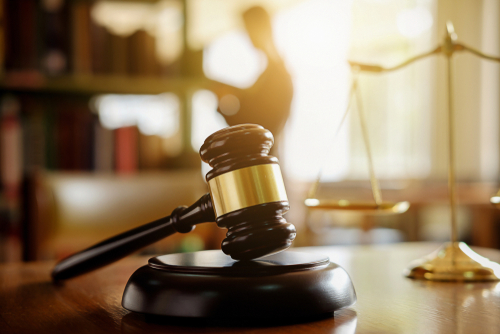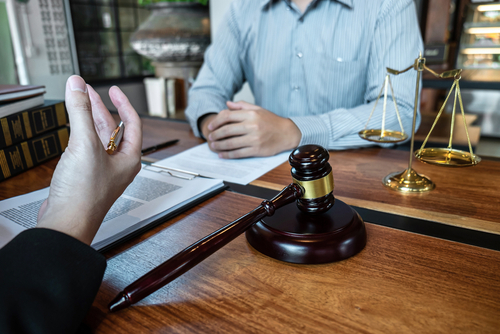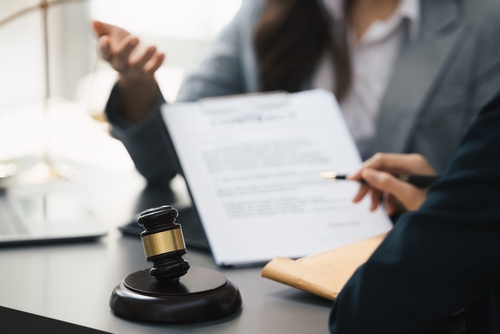
Leasing and Tenancy Agreements: Rights and Obligations in Singapore
September 28, 2023
Combatting Fraud: Legal Strategies and Solutions
December 6, 2023Litigation Process in Singapore: From Filing to Resolution

Litigation Process in Singapore From Filing to Resolution
Litigation Process in Singapore: From Filing to Resolution. Litigation plays a significant role in Singapore’s legal landscape, allowing individuals and businesses to resolve disputes.
Understanding the stages of litigation is crucial for navigating this process effectively.
Litigation is vital for upholding justice and resolving conflicts within Singapore’s society and business environment.
It ensures parties have a fair and impartial forum for seeking legal remedies.
For individuals and businesses, comprehending the stages of litigation is essential. It allows them to make informed decisions, engage in the process effectively, and seek appropriate legal counsel when necessary.
Pre-Litigation Phase

Before entering formal litigation, parties have opportunities for early dispute resolution.
Early Dispute Resolution Options
Parties can explore various methods to resolve disputes informally. These include negotiation and mediation, which aim to reach mutually acceptable solutions without going to court.
Negotiation and Mediation
Negotiation involves direct communication between parties to reach an agreement. Mediation involves a neutral third party who facilitates discussions and assists in finding common ground.
Demand Letters and Pre-Action Protocols
Parties may also engage in the exchange of demand letters outlining grievances and potential resolutions. Some cases may require adherence to pre-action protocols, ensuring parties fulfill certain procedural requirements.
Benefits of Resolving Disputes Early
Resolving disputes before entering formal litigation can save time, costs, and the emotional toll of court proceedings. It also allows parties to maintain greater control over the outcome.
Initiating a Lawsuit
When disputes cannot be resolved through negotiation or mediation, parties may initiate a lawsuit.
Filing a Writ of Summons or Originating Summons
A lawsuit begins with the filing of a Writ of Summons or Originating Summons, which outlines the claims and relief sought. Proper documentation and legal representation are crucial at this stage.
Jurisdiction and Venue Considerations
Determining the appropriate court and jurisdiction for the case is essential. Jurisdictional issues may arise in cases with international elements.
Pleadings

It is a formal written document exchanged between parties in a lawsuit.
The Plaintiff’s Statement of Claim
The Plaintiff’s Statement of Claim sets out the facts and legal basis for the case, detailing the alleged wrongdoing and the relief sought.
The Defendant’s Defense and Counterclaim
Defendant responds with a Defense and may file a Counterclaim against Plaintiff, asserting their own claims for relief.
Significance of Setting Out Legal Basis
Pleadings clarify the issues in dispute and provide a roadmap for the court and the parties involved.
Interlocutory Applications
Interlocutory applications are motions and requests made during the course of litigation.
Discovery of Documents
Parties may request the exchange of relevant documents to build their case.
Interrogatories and Requests for Admissions
Interrogatories involve written questions to the opposing party, while requests for admissions seek admissions or denials of specific facts.
Injunctions and Interim Orders
Injunctions and interim orders are court orders that may be issued to preserve assets or prevent harm during litigation.
Case Management Conferences and Timetables
The court may hold case management conferences to ensure efficient progress and adherence to timetables.
Trial Preparation

Preparing for trial involves building a strong case through evidence and legal arguments.
Building the Case Through Evidence Gathering
Parties gather evidence, including documents, witness statements, and expert opinions.
Witness Statements and Expert Opinions
Witness statements are written accounts of witnesses’ testimony, while expert opinions provide specialized knowledge.
Preparing Legal Arguments and Submissions
Legal teams craft persuasive legal arguments and submissions to present to the court.
Pre-Trial Conferences and Settlements
Pre-trial conferences may lead to settlements, avoiding the need for a full trial.
The Trial
Role of Judges and Legal Representatives
Judges oversee the proceedings and ensure adherence to legal principles. Legal representatives present evidence and arguments on behalf of their clients.
Examination and Cross-Examination of Witnesses
Witnesses are examined by the parties’ legal representatives and subject to cross-examination to test the credibility of their testimony.
Presentation of Evidence and Legal Arguments
Parties present their evidence and legal arguments to support their claims or defenses.
Importance of Courtroom Etiquette and Decorum
Courtroom etiquette and decorum are essential to maintain respect for the judicial process.
Judgment
Delivery of the Judgment
The court delivers the judgment, including findings of liability, damages, or other remedies.
Implications of the Judgment
Judgments have legal consequences, and parties must comply with court orders.
Enforcement of Judgments and Court Orders
The successful party may need to take steps to enforce the judgment and recover damages.
Post-Trial Options

After a judgment, parties have several options for further action.
Appealing a Judgment
Parties dissatisfied with a judgment may have the right to appeal to a higher court.
Enforcement of Judgments and Recovery of Damages
Enforcement measures may be necessary to collect damages awarded in the judgment.
Negotiating Settlements After Judgment
Even after a judgment, parties can negotiate settlements to resolve outstanding issues.
Alternative Dispute Resolution (ADR)
ADR methods provide alternatives to litigation.
Frequently Asked Questions (FAQs)
How long does a typical litigation process take in Singapore?
The duration varies depending on the complexity of the case, but it can take several months to several years.
What are the costs associated with litigation?
Costs may include legal fees, court fees, and expenses related to evidence gathering.
Can parties resolve a dispute without going to trial?
Yes, parties can explore negotiation, mediation, or settlement options.
Are there any limitations on filing a lawsuit in Singapore?
Certain time limits may apply, and jurisdictional issues must be considered.
How are judgments enforced in Singapore?
Judgments can be enforced through various legal mechanisms, including court orders.
What is the success rate of ADR methods compared to litigation?
The success of ADR methods depends on the specific circumstances, but they often offer efficient and mutually acceptable resolutions.
Can individuals represent themselves in court?
Individuals have the right to represent themselves, but legal representation is advisable for complex cases.
What are the ethical considerations for legal practitioners in litigation?
Legal practitioners must adhere to ethical standards, including maintaining confidentiality and acting in their clients’ best interests.
How does Singapore’s legal system handle international disputes?
Singapore has a well-developed framework for handling international disputes through arbitration and mediation.
What are the advantages of settling out of court?
Settling out of court can save time, costs, and emotional stress, and parties have more control over the outcome.
Litigation Process in Singapore: From Filing to Resolution – Conclusion

In conclusion, understanding the litigation process in Singapore is essential for individuals and businesses seeking to resolve disputes effectively.
Whether through negotiation, formal litigation, or alternative dispute resolution, parties have various options for seeking justice.
Legal counsel and a thorough understanding of one’s rights and responsibilities are invaluable in navigating this complex landscape.
Encouragement is extended to parties to explore dispute resolution options tailored to their specific needs to achieve fair and just outcomes.
Are you seeking a professional and reliable lawyer in Singapore? Contact us today!



